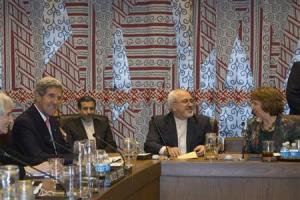By Kelsey Davenport
 U.S. Secretary of State John Kerry meets with Iranian Foreign Minister Javad Zarif last September during the UN General Assembly. Kerry and Zarif met again Sept 21, 2014 to continue nuclear talks. (photo credit: Reuters)
U.S. Secretary of State John Kerry meets with Iranian Foreign Minister Javad Zarif last September during the UN General Assembly. Kerry and Zarif met again Sept 21, 2014 to continue nuclear talks. (photo credit: Reuters)
In a Sept. 19 letter to U.S. Secretary of State John Kerry, 31 Republican senators requested that the administration reveal answers to very specific questions about the U.S. negotiating position on elements of a comprehensive nuclear deal with Iran, even as the U.S. diplomats are negotiating with the Iranians in New York.
The letter, led by Sen. Mark Kirk (R-Ill.) came on the heels of a report in The New York Times published Friday night that claims the administration has, as part of a comprehensive agreement, proposed disconnecting the piping that connects a portion of Iran's 19,000 centrifuges as opposed to requiring their dismantlement.. On Saturday, Kirk told news outlets that this solution was unacceptable to him.
While the negotiations are ongoing, Congress should not push the administration to stake out its positions. It is counterproductive and could undermine the United States and its P5+1 partners while the talks are ongoing.
In the letter, the senators ask if the United States will accept an alternative to dismantlement of Iran's installed centrifuges, implying that any such alternatives are unacceptable. But with appropriate limits and intrusive monitoring, Iran can retain a uranium-enrichment program, while the international community is assured that Tehran cannot move quickly to produce material for nuclear weapons.
The letter also asks if the administration will accept less than "dismantlement" of the heavy-water reactor under construction at Arak. Such questions suggest the senators have unrealistic expectations about what is necessary and is possible to prevent Iran from building up its nuclear capabilities and pursuing nuclear weapons in the future.
The Arak heavy-water reactor, as currently designed, is a proliferation threat, but demands that it is dismantled will drive Iran away from the negotiating table and are not necessary to head off the plutonium path to nuclear weapons. The reactor can be modified to produce significantly less plutonium on a yearly basis – far below what is required for a nuclear weapon.
Kirk said the Senate would not support sanctions relief in a comprehensive agreement based on "creative solutions" that do not require "irreversible steps" to limit Iran's nuclear program.
Serious policy makers, however, understand that a that a comprehensive nuclear deal with Iran should not be judged on the basis of a single metric and will require practical but creative solutions to bridge the remaining gaps.
Senators should recognize that this is the time to move the two sides closer to an effective, long-term deal and its not the time for the senators to take a seat at the negotiating table in New York—because an effective, good deal is the best chance that the United States has to guard against a nuclear-armed Iran.
